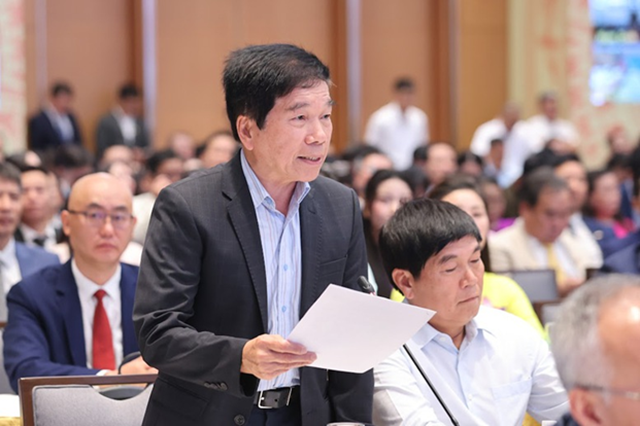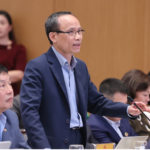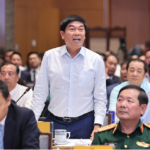At the seminar with businesses and business associations to effectively implement Resolution 68 of the Politburo, chaired by Prime Minister Pham Minh Chinh on May 31, Mr. Nguyen Quoc Hiep, Chairman of the Vietnam Construction Contractors Association, shared that first of all, as a business, we believe that Resolutions 66 and 68 of the Politburo are truly golden keys for businesses to overcome long-standing barriers in the business environment, which has already been very harsh. It is a revolution in the perception of the role of private enterprises in the cause of building and developing the country’s economy. However, the transition from awareness to specific actions is a process that requires the entire system of authorities at all levels to get involved.

Mr. Nguyen Quoc Hiep – Chairman of the Vietnam Construction Contractors Association
|
The new points in Resolutions 66 and 68 are certainly very clear to businesses. As a real estate investment enterprise and also representing the Vietnam Construction Contractors Association, Mr. Hiep proposed to the Prime Minister a few points as follows:
First, regarding the inspection mechanism. Resolution 68 clearly states that enterprises will only be inspected once a year if necessary. However, we believe that if we do not specify and clearly identify which agency coordinates the inspection work, there will still be overlapping inspections of enterprises. For example, the tax agency, the land management agency, the construction management agency, the planning agency, the fire protection management agency, etc., can all inspect real estate enterprises. So, which agency will coordinate the inspection work so that enterprises are only inspected once a year? Here, the ministries and branches are independent of each other, not to mention that local authorities can also request inspections of enterprises. Therefore, this is an issue that we very much hope will be paid attention to and directed to help businesses not be hindered by inspections, as each inspection takes a lot of time.
Second, regarding the issue of institutions and legal systems, we believe that this is an issue that businesses in general and real estate businesses, in particular, find very cumbersome and obstructive, although recently the National Assembly has passed the 2024 Land Law, the 2023 Housing Law, the 2023 Real Estate Business Law, and many other laws to remove difficulties for the market. In the process of applying the new laws, the Government has also issued decrees and circulars guiding their implementation in detail. However, some documents have provisions that are not really reasonable and accurate when applied to specific cases. For example, Decree 103 on guiding the collection of land use fees from enterprises is still very inadequate and unreasonable because enterprises are not involved in land price appraisal, but when the land price appraisal is slow, enterprises have to pay additional fees. We believe that this is a very inadequate and unreasonable point, and we very much hope that the Prime Minister will resolve this issue. In addition, there are other decrees, for example, on bidding, projects with land use rights still have some points that we think are unreasonable, so enterprises have difficulties in implementing them. Therefore, we propose that before issuing legal documents, it is necessary to have contributions and opinions from experts and direct subjects; the quality of the documents needs to be checked carefully because revising a document causes a lot of waste of time and money for enterprises.
Third, regarding the viewpoint, Resolution 68 requires that enterprises are objects of service instead of objects of management. This is an issue that businesses are very interested in. However, changing these four words in the document is a revolution in the thinking and perception of our civil servants today. In fact, we have encountered a case in a locality where, due to the unclear guidance of the decrees, the Department of Planning and Investment of that locality required the enterprise to ask the Ministry of Planning and Investment, directly the Bidding Department and the Department of Legal Affairs, which took 5 months to answer but could not answer clearly because the document did not go straight to the problem, only citing the law and requiring the locality to apply. After that 5 months, we asked the Ministry of Agriculture and Environment, and it took another 2 months to settle the issue. Thus, it took 7 months, and the enterprise had to wait for unclear procedures and paperwork. If it is a service perspective, we would probably have gotten an answer sooner. To realize this viewpoint, we propose that localities are allowed to meet with investing, producing, and trading enterprises in the area every 6 months to contribute ideas to the public administration on administrative procedures that need to be improved and changed in the management and administration.
Regarding simplifying administrative procedures, we are currently striving to reduce 30% of administrative procedures. We believe that to simplify administrative procedures, there are two steps. First, it is necessary to reduce legal procedures in the steps of investment and business, for example, cutting down on investment licensing procedures, adjusting planning and construction permits, which the Prime Minister recently signed in Dispatch No. 78 sent to ministries and branches. For procedures that cannot be removed, it is necessary to concretize the way of implementation, digitize it, and specify the time and address of responsibility. Especially for the real estate investment sector, there needs to be a unified agency to prescribe mandatory procedures and streamline the investment process to guide enterprises.
In addition, from the perspective of representing the Vietnam Construction Contractors Association, in the context that the country is renewing itself day by day and preparing to implement key national projects such as the high-speed railway project, we would like to propose to the Prime Minister the following contents:
First of all, we propose to change and remove the detailed unit price system, build a synthetic unit price for a unit of product as the world is doing now. This is necessary and suitable, especially to allow contractors to fully promote their capacity in construction. Especially, the unit price of wages should be changed to encourage the labor force in the construction industry. Currently, only our country still uses detailed unit prices, while other countries use synthetic unit prices. In addition, the unit price of wages is very inadequate, currently only 40% of the actual wage rate.
Second is the special mechanism. In the context that large projects are demanding enormous resources, the whole construction industry proposes that the Prime Minister implement a mechanism of putting up for bidding or conditional designation to have enough time to prepare labor, vehicles, equipment, and technology. On that basis, promote the comprehensive strength of contractors. Currently, the Association is proceeding to arrange the capacity of contractors, rank contractors, and in this context, we do not have the capacity to rank specifically. The Association will introduce typical contractors who are capable for the Prime Minister to consider.
Finally, regarding training and development to meet the requirements of transformation, reception of science and technology, and new techniques, most Vietnamese contractors are small and medium-sized enterprises, so they face difficulties in training. Therefore, there needs to be a mechanism for public-private cooperation in training to meet the demand for human resources in the construction industry. The Association has officially proposed to the Ministry of Construction and requested a meeting to present all the difficulties of the construction industry.
The Breakthrough Era for Private Economy
Private enterprises are now encouraged to enter strategic sectors that were once considered “off-limits”, such as defense industry, security, and high-speed railways.
No Criminalization of Economic and Civil Relations: Experts Urge for a Necessary Step
“Deregulating and reducing the number of conditional business sectors is key to curbing over-criminalization. By simply deregulating one conditional business sector, numerous binding regulations and accompanying procedures can be eliminated,” stated the former Vice Chairman of the National Assembly’s Committee.
“The Chairman of Hoa Phat Group Emphasizes on Prioritizing Domestic Production: A Mandate for Government Projects”
“Mr. Tran Dinh Long, Chairman of Hoa Phat Group, has proposed that all public investment projects, such as highways, should have a minimum of 70% domestic content. This bold suggestion highlights the potential for local manufacturing and the opportunity to reduce reliance on imports. With a strong belief in the capabilities of Vietnamese industries, Mr. Long envisions a future where local products take center stage in national development, paving the way for economic growth and a more resilient Vietnam.”
The Capital and Land Conundrum: A Business’s Vexing Dilemma
The industrial zone leader in Hai Phong revealed that land prices in these zones have doubled over the past five years, soaring to 200 USD per square meter. This surge in prices has left businesses struggling to secure land for their factory constructions.





















